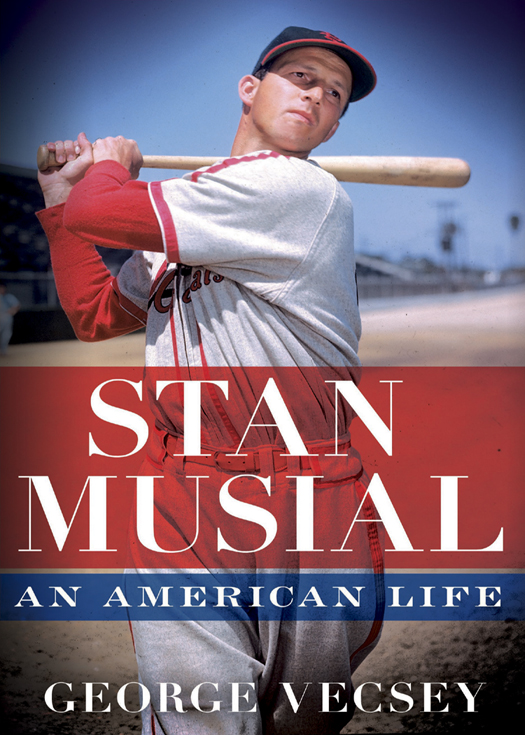
Stan Musial
An American Life
کتاب های مرتبط
- اطلاعات
- نقد و بررسی
- دیدگاه کاربران
نقد و بررسی

March 28, 2011
Great bat, no personality is the conclusion in this genial biography of the St. Louis Cardinals slugger. New York Times sports columnist Vecsey (Baseball: A History of Americaâs Favorite Game) insists that the Hall of Famerâs 475 homers and .331 lifetime batting average put him in the company of hallowed contemporaries Joe DiMaggio and Ted Williams. Alas, where the aloof Yankee Clipper and the cantankerous Splendid Splinter shared a prickly charisma, Stan the Manâeven a stolid nicknameâwas "the boring one." Vecsey chronicles Musialâs enormously successful if oddly uneventful career, his nonracist (though not outspokenly so) behavior as baseball was desegregating, his kind and self-effacing manner, his happy marriage, his cordial relations with umpires, even his lawn-mowing. A coiled, crouching, butt-waggling batting stance is his only eccentricity. A sportswriter to the bone, Vecsey clothes his subjectâs colorlessness in stirring metaphor and world-historical allusion: if DiMaggio and Williams were "the stormy Himalayas," Musial was "the weathered Appalachians," he rhapsodizes, and caps his account of the Cardsâ 1946 World Series victory with the news that "less than two hours later, ten Nazi leaders were hanged." Unfortunately, no amount of manful writing and extraneous anecdote can redeem the basic dullness of Musialâs story. Photos.

April 1, 2011
A deeply admiring, fawning biography of the great St. Louis Cardinal.
Longtime New York Times sports columnist Vecsey (Baseball: A History of America's Favorite Game, 2006, etc.) wears glasses with deeply Cardinal-colored lenses throughout his anecdotal record of the Hall of Fame left fielder/first baseman, whose spectacular career—which included a .331 lifetime average and a record 24 All-Star selections—ran from 1941 to 1963. Readers who want details about Musial's personal life will have to wait for a more rigorous treatment, as will fans who want thorough descriptions of specific games and seasons. But those who want repetitious pages about the wonders of the character of Stan the Man will find their appetites quickly sated. Vecsey narrates chronologically, but there are numerous brief interchapters highlighting moments in Musial's life, generally designed to establish his sainthood qualifications—his acts of kindness and comments from adoring fans and former teammates. Rarely does the author say anything negative (Musial once refused to sign an autograph), but, otherwise, it's trivia and treacle. Vecsey even ends with a personal memory of Musial's warm hand after a recent handshake. The author celebrates Musial's great 1962 season (he hit .330) but neglects to mention his subsequent year (.255)—or to note that in his final five seasons he hit over .300 only once. Repeatedly, Vecsey laments Musial's inferior position to Joe DiMaggio and Ted Williams in most fans' minds, attributing it to Musial's self-effacing goodness. In perhaps the most egregious example of his tendentiousness, the author notes that Musial went to his St. Louis restaurant the night of the JFK assassination because he realized "his buddy had been gunned down, and the world needed to see Stanley."
Rather than a journalist's or a biographer's disinterested analysis, the author offers a fan's notes.
(COPYRIGHT (2011) KIRKUS REVIEWS/NIELSEN BUSINESS MEDIA, INC. ALL RIGHTS RESERVED.)

May 15, 2011
If Stan Musials personality lacks the draw of such transcendent peers as Ted Williams, Joe DiMaggio, and Willie Mays, his stats didnt lack a thing. Musial won three MVP awards, compiled a lifetime .331 batting average in his 22 years as a St. Louis Cardinal, and amassed a career base total second only to Henry Aarons, among other signature accomplishments. Its hard not to be impressed by the arduous journey Musial made from the small, industrial mill town of Donora, Pennsylvania; the firepower he generated from his slim body and oddly coiled batting stance; and the generosity and fairness he radiated toward fans and fellow players alike. Donoran Wayne Stewarts Stan the Man (2010) is a fitting valentine to the St. Louis Hall of Famer, but Vecsey gives fuller measure, but no less respect, to Musials life both on and off the field. Vecseys name recognition as a New York Times sports columnist should give an added bump to his fine biography.(Reprinted with permission of Booklist, copyright 2011, American Library Association.)

























دیدگاه کاربران